Chapter Twenty: News From Everywhere (1995-1996)
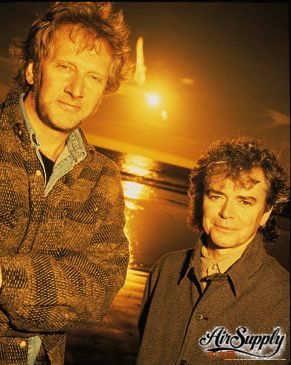
In January of 1995, the new album was almost complete and Air Supply began a short tour of the U.S. They performed in a rather minimalist fashion, as a three-piece band as opposed to five-piece unit they had used for years. The shows were billed as an acoustic celebration of their 20th year together, a concept they introduced in 1990. The unplugged show featured a stark set, with a candelabra resting on the piano that added a bit more stature than the MTV living room couch approach used by so many artists. “The show is very acoustic,” said Russell. “We’ve found that a great song is a great song and lends itself to a lot of different surroundings, musically.”
The live band now consisted of Mark Williams on drums, Cliff Rehrig on bass, and either Guy Allison or Hans Zermuehlen on piano. “The band we have with us now will hopefully be with us forever because it really is a family,” said Graham. “I know that is really cliche, but it is with us, you know. Not only are they excellent musicians but they know the way that Russell and I think. They do play with other people and they come from great musical stock.” Air Supply played several new songs in concert from the forthcoming album, which was expected for release in March in most countries. “We’ve done four or five shows so far, and the people who have seen us have all be complimentary,” says Russell. “We are playing most of the things people are familiar with but hopefully they will enjoy the stuff we’re going to play from the new record. It’s a great-sounding album, but it’s the kind of thing that needs to be listened to actively. It’s quite an intense album for us.”
The tour throughout the States showed Air Supply using in-ear monitors on stage, eliminating the need for floor monitors or wedges. This relatively new technology made it possible to move freely around the stage without losing a dedicated monitor. But more importantly, they reduced the strain on a performers hearing and vocals. “We have these specifically made for our ears so that we can listen to the sound on the stage,” describes Russell. “This is more new technology that is very difficult to get used to. They stick this stuff in your ear that is like a Styrofoam and they then yank it out, send it away and give you these tiny little headphones, like what you get with a Sony Walkman. The problem with them for me was not the actual sound in them, but a lot of the stuff we do in concert rely on what the people in the audience are saying. So I have to take one out after each song so I can hear if anybody is making any smart remarks, then I put them back in to sing. They come so highly recommended because they save your voice, and your ears also because you don't have to have such a loud volume on stage. They really are a life saver.”
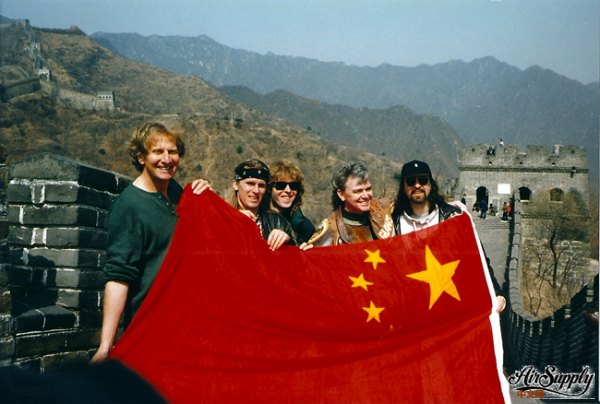
Graham, Cliff, Mark, Russell, Guy - China 1995
On March 15, Air Supply was invited by the Ministry of Culture to perform six concerts inside communist China, two each in Beijing, Shanghai and Guangzhou. The 90-minute concerts were televised, but only to a domestic audience within China. Air Supply’s middle-of-the-road image and its string of chart-topping ballads made them very popular all over the country. Concert organizers charged 4.8 million yuan ($775 million) to any company that agreed to become the sole advertiser and sponsor of the Air Supply tour.
Air Supply was the second Australian band to appear in China. Australian rock band Yothu Yindi made a brief appearance in 1994 when they played an impromptu performance at a local bar. They were in Beijing to film part of an advertisement for Qantas. Other Western musicians to have performed in China by government invitation included Paula Abdul, John Denver, Paul Simon, Wham! and BB King. Other major stars such as Madonna had tried to perform in China but were refused permission by the authorities.
Just one week before Air Supply performed in China, Swedish pop band Roxette played a single concert in Beijing. Bringing Roxette to China’s capital took more than a year to arrange, and Chinese government officials had to see performance videos before they gave the OK. The band was forced to sensor their lyrics somewhat; ‘making up to you’ instead of ‘making love to you.’ SheRock was the first American band to be invited to tour and record in China. The group performed a total of 16 concerts in the cities of Shanghai, Huangzhou and Guangzhou before an estimated 125,000 people. Edie Robertson, SheRock’s lead singer, said that the group made some adjustments for the visit. “We had to modify our dress and some of our lyrics. For instance, we had to change the word ‘freedom’ to ‘friendship,’ as the former has apparently rebellious connotations.”
The concerts in China were an indication of the countries growing commercial appeal to Western pop artists. Air Supply was well positioned to take advantage of this huge market despite strict rules enforced by the communist government. “When we first went there to tour, we had to go in front of this panel,” said Graham. “You had to bring all the lyrics, what your were going to wear on stage, and what songs you were going to do. There were all these generals sitting behind a semi-circular desk and you come in for an interview. They are all sitting very stiff, wearing all kinds of medals, and they ask all sorts of questions through an interpreter. But you have to pass this test before you can play. We had never been there before, and our only exposure to China has been through television and magazines, but right from the very first song that we played, people went crazy.”
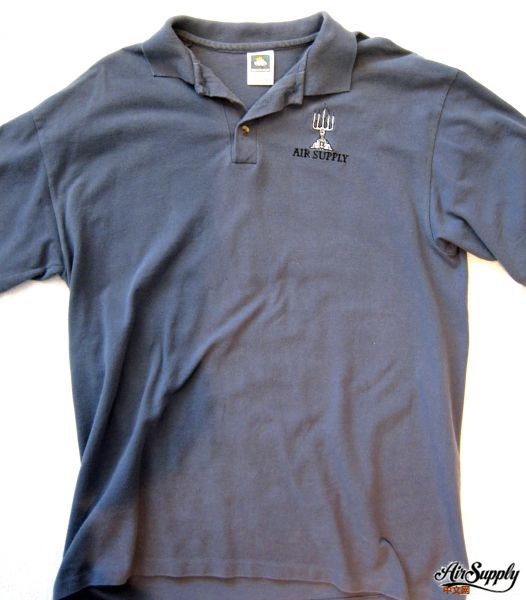
“For the Beijing shows we played a few nights in this basketball stadium,” says Russell, “and we were given a warning because we usually go into the crowd during the show, but they said we could not go into the audience or they would stop the show. The first two nights we did not go into the audience, but the third night we did and all these green uniforms came rushing forward. But by then it was too late.” Air Supply’s tour of China was an overwhelming success as all six shows were a sellout. An impressive accomplishment considering the Beijing venue’s each seated 20,000. In addition, the band was not sure what kind of response they would get from a country they had not played before. “The people knew every word we were singing,” said Russell. “That makes you feel warm inside.”
Air Supply’s popularity in Asia and Latin America meant that Graham and Russell had very little time to spend on individual projects. Graham’s Robin Hood-inspired rock opera was shelved indefinitely. He knew it would be a tough sell after the release of several Robin Hood movies and plays, including the popular Kevin Costner film in 1991 and the Mel Brooks comedy Robin Hood: Men In Tights. Graham included the title song, ‘The Heart of the Rose,’ on the new Air Supply album. “I wrote the song in 1988,” recalls Graham. “It is a lush meditation on the essence of life, and holds special meaning for me. And, I’ve been saving it. I hope the song touches people.”
It was during this time that Russell had surgery to help cure his longtime battle with throat infections. “I had my tonsils out, which was very traumatic for me,” he said. “It took me a long time to mentally get over it, but I had so much trouble before the operation with throat infections and having to cancel shows and stuff like that. It’s a drag when you have your tonsils out as an adult. It’s really painful in your 40s. Since I’ve had the surgery, I’ve been pretty good. I got over the mental thing of having them out, and I think I sing better now than I used to. I sometimes listen to our early recordings and I don’t like the way my voice sounds. I sometimes wish I had some scratch like Joe Cocker or Rod Stewart. But I don’t have that and I’m stuck with this.”
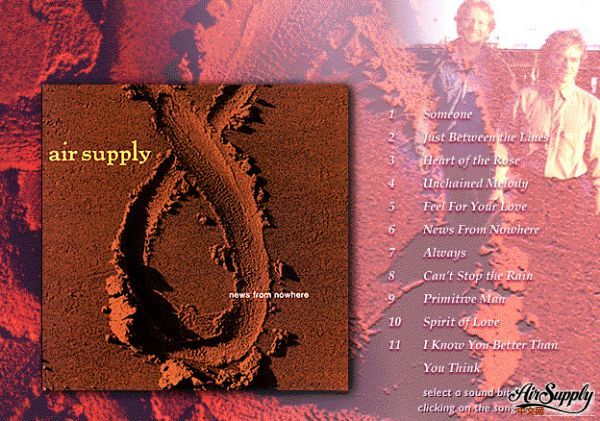
The album ‘News From Nowhere’ was released on March 28, along with the first single ‘Someone.’ There was very little promotion for the album in North America, so many Air Supply fans were pleasantly surprised to find the CD on the new release wall in record stores. The lack of promotion by Giant Records was perhaps an indication of the labels falling confidence in the bands ability to sell records in North America. There were also internal problems developing within the Giant organization, which threatened to change how the label operated. Regardless, ‘Someone’ was released as a single in North America, South East Asia and South America, and debuted at #60 on the Billboard AC chart. Radio response to the song was lukewarm at best despite a positive review by Billboard Magazine:
Aussie male duo that racked up countless hits during the 80s is ushered back into the competitive fray with a pop ballad that rolls with a rock/world-beat slant a la Peter Gabriel’s ‘In Your Eyes.’ The two swap verses and chorus segments to dramatic effect - thanks largely to the fact that both still have wildly limber tenor vocal power. First peek into ‘News From Nowhere’ has tremendous promise for widespread play at adult pop radio. - Billboard
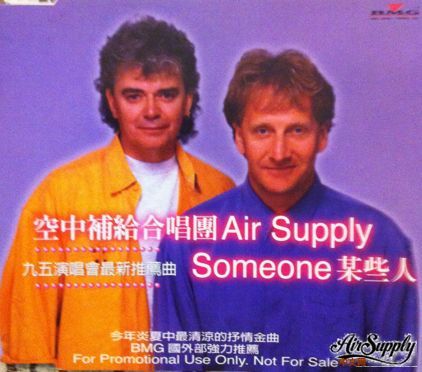
'Someone' Single (Daniel Salome)
BMG International promoted the album heavily in Asia and had big plans for the band in 1995. To promote the album in the Philippines, several free concerts were announced in April for those who bought a copy of ‘News From Nowhere.’ In late 1994, Clive Gardiner and Air Supply began work on a karaoke video release for the Asian market. The concept was part of BMG’s worldwide move into karaoke entertainment, and the creation of a new original-artist karaoke label called Karaoke Gold. Gardiner was the head of the video department of BMG Entertainment Asia-Pacific division in Hong Kong, and his plan was to develop a multi-format project that centered on a live, 20-track karaoke Laserdisc.
The Laserdisc concept may have been puzzling to those in North America, because the format was only popular with a small group of enthusiasts, who preferred its superior picture quality to that of VHS and BETA. But in the more affluent areas of Asia, such as Japan, Singapore, Malaysia and Hong Kong, Laserdisc was the preferred home video format. In fact, Laserdisc was the primary video rental medium in Hong Kong. Gardiner knew the huge potential of the project based on the successful karaoke album by the Bee Gees in 1992, which sold 25,000 units while using outdated video footage. BMG predicted that an Air Supply karaoke Laserdisc might sell 50,000 units, while a live music CD of Air Supply’s greatest hits could reach sales of over 600,000. The project also offered Giant Records an opportunity to capitalize on Air Supply’s success in the 80s. Because the CD was to be a live recording, Giant could release the product in North America with a percentage of earlier Air Supply hits owned by Arista, without having to pay royalties. BMG International was licensed to use Arista recordings because of the partnership they formed several years earlier, which had already resulted in the release of several Arista-based Air Supply compilations outside of North America.
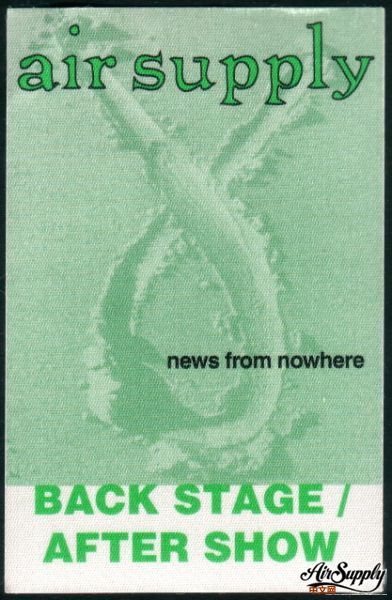
Air Supply returned to the Philippines in early April for a six-day promotional tour in support of ‘News From Nowhere.’ The trip was part of a lengthy five week tour of Asia that included radio and television appearances and several concerts that focused on the new record. This tour was a prelude to another five week tour of southeast Asia in May and June. During press interviews, Graham told reporters that ‘News From Nowhere’ was the most personal record he had ever written. He wrote or co-wrote 10 of the 11 tracks, some of which touch on the spiritual side of life. “It is different from our previous efforts, although we do recognize that our love songs and ballads have a strong following,” said Graham. “There is a sort of spirituality in this album, and it comes through if you listen carefully enough. We have gone through quite a bit, and this album is perhaps a way of letting us know that we have pulled through fine. I don’t think the [song writing] process has changed, but the way I look at songs, I’ve got a lot better at. In the early years, I used to write a song and that was it. But now I think about it very carefully before I complete the song. The lyrics have become much more important for me now, where in the past, I wrote a lot of lyrics that didn’t necessarily make any sense.”
‘Just Between the Lines’ is a song included on ‘News From Nowhere’ that Graham wrote in the 70s, and contains lyrics that are not easy to follow. “This is a song Russell and I used to sing a long time ago when we were still in Superstar,” said Graham. “I rediscovered the song in my Dad’s basement. He lives in Tweed Heads and he was getting on my case about getting rid of a lot of junk I had down there. I found a lot of old tapes including one with this song. I played it to Russell when we were recording ‘News From Nowhere’ and he said that we should do it. It is the favourite song on the album for a lot of people, but it could never be a single, as it’s a bit too esoteric. The words don’t really make sense, but they do to me.” Graham collaborated with Guy Allison on a track called ‘Can’t Stop The Rain.’ “This was written by Graham and me after a gig one night while riding on the bus,” recalls Allison. “It was my first real string arrangement that went to manuscript paper first. Although not a single, it has always been one of my favourite tracks on this album. Both Graham’s and Russell’s vocals are very haunting.”
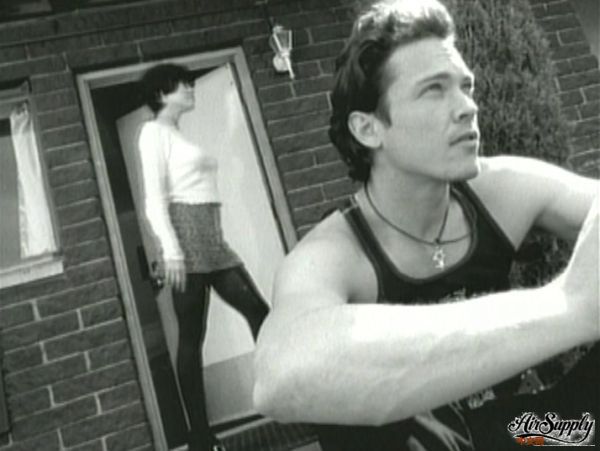
'Unchained Melody' Music Video
While back home in the States, Graham and Russell filmed music videos for future singles ‘Always,’ and the band’s remake of the Righteous Brothers’ ‘Unchained Melody.’ Both songs had enormous potential to get Air Supply deep into the American charts. “‘Unchained Melody’ is on the album because of requests from fans,” says Russell. “That’s the single reason for doing it. Without wanting to sound egotistical, I think we made it an ‘Air Supply’ song.” Graham felt Air Supply recorded the song because it needed to be “reintroduced to a new generation,” especially with his partner’s unique voice. Despite being one of the most covered songs of all time, Air Supply believed that their version was one of the best, and would succeed despite the onslaught of rock, heavy metal and grunge. “I didn’t want to do it,” said Graham, “because everybody and their dog had done it. But I agreed to do it because Russell really wanted to do it. I thought that he should sing it then, as he is one of the worlds greatest singers, and great singers should sing great songs. Once I agreed for myself to do it, we went in and I thought it was one of the best versions of the song. It was a big hit for us in Asia.”
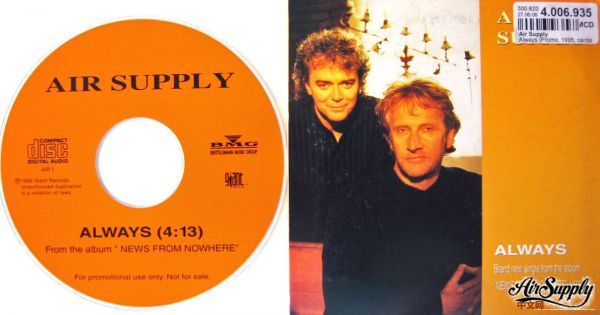
'Always' Promotional CD Single - Europe
In May, Air Supply began the long five-week tour throughout Asia, called the ‘Air Supply Always World Tour.’ The tour coincided with the release of the new single ‘Always,’ which was quickly climbing the music charts in the Philippines, Taiwan, and Hong Kong. It was also released in North America, where it did not chart. ‘News From Nowhere’ became the #1 selling album in Taiwan, proving that Air Supply could achieve success without a presence in America. “We actually pride ourselves in that fact,” said Russell. “The market for us in the U.S. is very limited.”
Air Supply’s popularity in the Philippines continued to grow, and this was apparent when a second show was added in Manila due to insistent public demand. On June 15-16, towards the end of the Asian tour, Air Supply played two live shows in Taipei, Taiwan. Both concerts were recorded as part of the BMG/Giant karaoke video and live CD project, expected for release in November or December. The concerts had Air Supply perform with the Taipei Symphony led by Mei-Ying Lin and Mark Williams. “For the video shoot, Mark conducted the string section, and I never knew he could do that,” said Russell. “I've known the guy for three or four years and I thought he was just a drummer!”
BMG Music Taiwan hosted a large party for Air Supply to celebrate the bands 20th anniversary, and the sale of over 160,000 units of ‘News From Nowhere’ in Taiwan. Band manager, Barry Siegel, took part in the festivities. “We have been looking forward to coming to Taipei this time for several reasons,” said Graham. “First, we have a lot of friends here now as we have been coming here for 14 years. Secondly, our album is doing very well here thanks to BMG.”
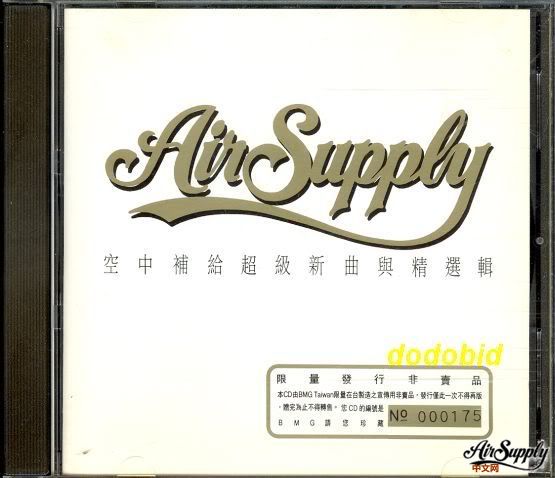
New Songs Sampler - Taiwan Promo
On August 25, the third North American fan club convention was organized around two free concerts at the New York State Fair Grounds in Syracuse. Air Supply played two one-hour sets, consisting of their most popular hits and a few songs from ‘News From Nowhere.’ The live band was Cliff Rehrig, Mark Williams and Hans Zermuehlen. After the second show, a fan gathering took place at the Hotel Syracuse where fans each received a gift upon entering the conference room. One of these gifts was a cassette single of a new and unreleased song called ‘The Way I Feel.’ “I wrote the song in Taiwan,” said Graham. “I had another song ready to go, and another before that. I felt strongly about both but then this one came along. Guy Allison had played the riff a long time ago in March or April and I had my tape recorder on. Guy tinkers around on the piano all the time, and when I hear something I’ll tell him to play it again. I changed the key of the song and within ten minutes it was done. I felt the song was very Beatles or John Lennon-sounding, which always excites me.” Fans at the convention were treated to a preview of the unreleased live concert video that was filmed in Taiwan three months earlier. It was announced that the fan club was about to undergo a major overhaul, with Simon Russell acting as the new club President.
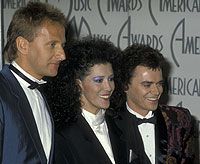
Rita Coolidge & Air Supply 1986
Russell ventured out on his own again as a solo artist to record a duet with American singer Rita Coolidge. The song, ‘Is It You,’ was included on Rita’s 1995 album ‘Behind The Memories,’ but was not released as a single. It went mostly unnoticed by Air Supply fans until several years later, when the internet provided greater access to rare and hard-to-find songs.
There were very few Air Supply compilation CDs released in 1995, as the record labels focused mostly on new material from the band. To help promote ‘News From Nowhere’ in Taiwan, BMG, Arista and Giant released a promotional CD called ‘Air Supply - Gold Hits & New Songs Sampler.’ The CD included the two latest singles ‘Always’ and ‘Unchained Melody,’ plus an impressive mix of 18 songs from 1980 to 1993. Because the CD was a promotional item, it was not released in large volumes, making it highly collectible.
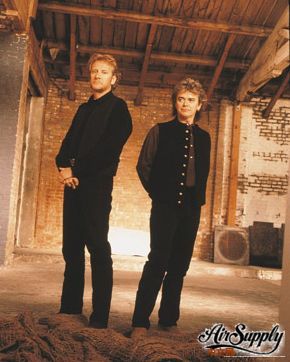
On November 11, BMG Entertainment held a party in Bombay, India, to announce a joint venture with Crescendo Music. Crescendo was a local Bombay company that rose from humble beginnings in a garage, to become one of the major players in the Indian music and entertainment business. Crescendo was the official distributor of Air Supply recordings in India, and the merger with BMG allowed them to become a multinational company. ‘News From Nowhere’ was released in India in August, and sold quite well considering Air Supply had not done any promotion in the country. In fact, Air Supply had never performed or promoted themselves in India for their entire 20 year career.
Graham and Russell flew into Bombay for a two-day visit and were impressed with India, despite the uncertainties of the traffic situation and power breakdowns the day before the ‘News From Nowhere’ launch. “People who have heard our music, and understand what we do, they are enthusiastic to see us, and that certainly has been the case here,” said Russell. “Right from when we arrived at the airport, everybody has been so wonderful to us, very warm, open and friendly. We’ve made several attempts in the past couple of years to come here to play concerts, but it was either the weather or some political upheaval that made us have to cancel our plans. But we have thought about coming here for a while.”
The BMG-Crescendo launch party was intended to be a quick promotional visit for Air Supply and other artists signed to BMG or Crescendo. The event was for invitees only, and included over one thousand of Bombay’s elite, representing a wide cross section that covered the music, film, fashion and media industries. BMG-Crescendo arranged for several artists to perform, including Indian bands Indus Creed, Mehnaz and Anaida, and Australian chart-topper Merril Bainbridge. As the evening progressed, Russell and Graham became overwhelmed with the live performances and decided to join in on the festivities. Wearing earrings and two-piece suits, they quickly put together five of their greatest hits and surprised the audience with an outstanding impromptu performance. It was the highlight of the night as the crowd clapped and sang along to all the songs. “Our performance was a gut reaction to the music that was being played,” said Russell. “We were fascinated by the stuff - the tablas, the Indian instruments - and thought why not? It was impromptu, nothing rehearsed, just a bunch of songs thrown together. We were surprised. People down in the front were calling out songs that were, for us now, a little obscure. It was very nice to hear that because it means that they’ve listened to the stuff quite intently, because those songs were not necessarily hits.”
Russell and Graham were unsure what to expect from crowds in India because they had very little knowledge of how many records they had sold in the country. “We don’t know what the sales are,” explains Graham, “but we presume that they are pretty good, otherwise they wouldn’t have asked us to come here. They are anticipating our sales to increase dramatically, but they must be fairly healthy already. I think because we’ve been together for twenty years now, most parts of the world have some kind of knowledge of us. And that’s a nice place to be after all these years. It’s great coming to India for the first time.” Before heading back to America, Air Supply and Crescendo discussed a future tour of India, perhaps as early as February.
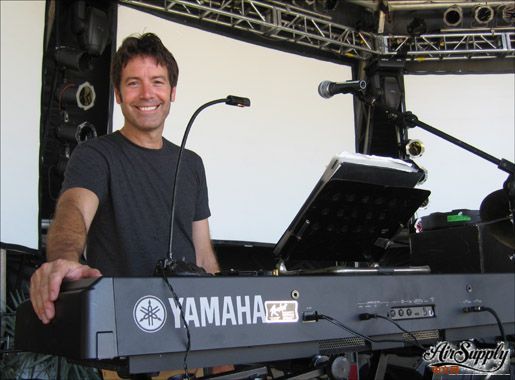
Jed Moss
As Air Supply prepared for a tour of South America, they learned that Guy Allison was leaving the band to join the Doobie Brothers. Graham quickly inquired at a music shop near his home in Utah, asking if they knew of any pianists who might be interested in going on a tour. The store owner, Skip Daynes, introduced Graham to a local pianist named Jed Moss. Graham invited him to his Utah home where Moss provided a small bio of himself. Without holding an official audition, Graham asked if he was interested in flying to Los Angeles to rehearse for a week, before leaving for South America. Moss gladly accepted the invitation but had doubts if he could fit the bill.
“Air Supply was leaving for a major tour of South America,” recalls Moss. “Graham told Skip he was looking for a classically trained pianist who has chops. I was working at Daynes Music shop, rehearsing upstairs on a 9-foot concert grand Steinway on consignment, which belonged to Graham.[Graham] simply gave me a stack of CDs and asked if I could learn these songs. In fact, I told a friend of mine in Los Angeles to stay home, because they would probably discover that I was a fraud and I’d be right back home. We rehearsed for four days and did one concert in Thousand Oaks, California. Our next concert was in Lima, Peru. I owe so much to these guys because they run all of their rehearsals like pros. It was good because I went into that with a blank page, and I was molded into what was needed. I told my parents, and they had heard all of Air Supply’s music, they just didn’t know Air Supply was the name of the group. So I told my mom I was playing with this group and she started bragging to all her friends that her son was playing for a group called ‘Quality Air.’ She told them that the band had a least ten big hits and everybody she told was like, ‘I’ve never heard of that group!’”
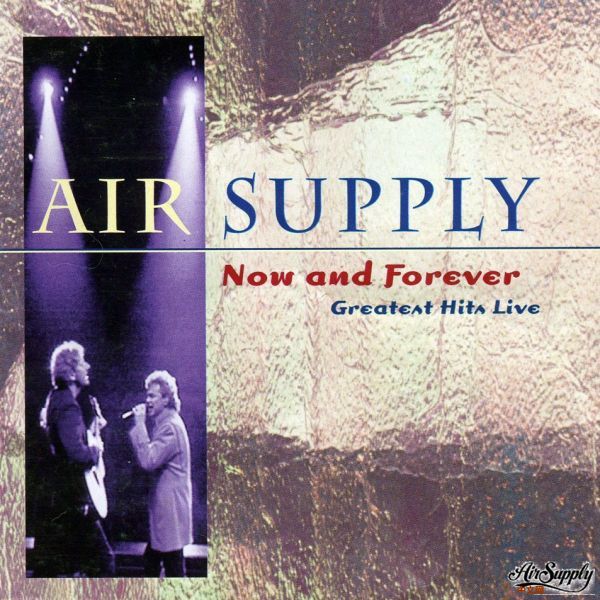
BMG 15 Track CD - 1995
In late November, BMG released three distinct Air Supply products in Asia, South America and Australia. The first was a live music CD called ‘Now and Forever - Greatest Hits Live.’ The second was a karaoke Laserdisc/VHS called ‘Now and Forever Karaoke.’ The third was a Laserdisc/VHS video special called ‘Now and Forever - Greatest Hits Live.’ The project was the result of over a year of hard work by Clive Gardiner, BMG and Giant Records.
“There are twenty songs on the long-form video, and fifteen on the audio CD,” said Graham. “We couldn’t put every hit, since we have more than fifteen. So we just really looked at the songs and the shows, and put together what we feel is part of a retrospective of our hits from the beginning to the present. It is multi-format: CD-ROM, karaoke, Laserdisc, and three video formats. It’s a landmark for us and I think it’s gonna be a big seller. The release date is November 30th all over the world, except America and Europe, where it comes out in February, 1996.”
Included on the live CD and videos were two new studio recordings, ‘The Way I Feel,’ and a re-recorded version of the 1982 song, ‘Now and Forever.’ ‘The Way I Feel’ was released as a single in some parts of Asia, and was a #1 hit in China and Taiwan. “This song was a big hit in many countries,” said Graham. “It has a very unusual chord structure that changes key in the verse. I love to do that, it sends you on a journey.” The ‘Now and Forever - Greatest Hits’ CD took the Asian music charts by storm, especially in Hong Kong where it was the #1 album for 15 weeks. In Australia, it reached #60 on the Kent Music Report, which was quite an accomplishment considering all three previous Air Supply albums from Giant/BMG failed to chart in Australia.
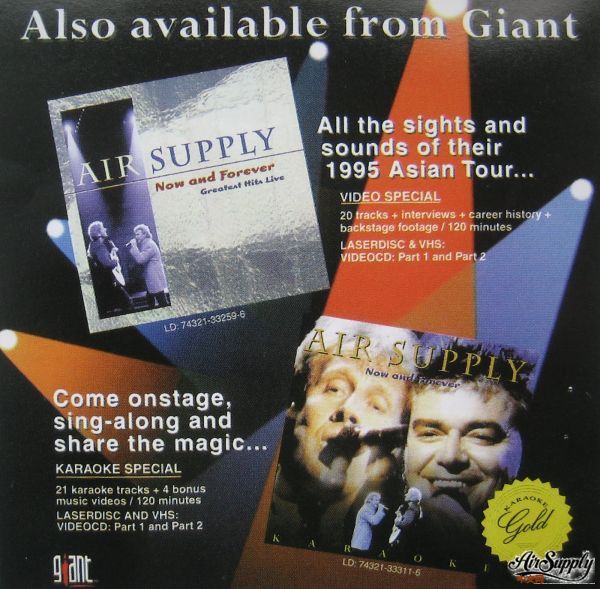
Giant Records U.S. Advertisement - 1996
The ‘Now and Forever Karaoke’ and ‘Now and Forever - Greatest Hits Live’ Laserdisc/VHS videos were selling well, perhaps bolstered by KTV, a Singapore-based satellite TV channel that ran promotional telecasts for the CD and video. In addition, BMG, Warner, and several other record labels purchased a 50% share of STAR TV’s music station Channel [V], which served as an advertising tool for Air Supply’s new releases. MTV refused to play Air Supply video’s, but there was suddenly new opportunities for the band on international TV. “This is the one we have been waiting to do,” says BMG marketing VP Stuart Rubin. “It’s a totally integrated project that is perfect for TV marketing. Air Supply embraced it from the start, because their melodies and lyrics fit right into Asia’s emotional connection to love songs.”
The video portion of the karaoke product was taken from the two concerts in Taiwan, and included five promotional Air Supply music videos. “This format has been virtually ignored by Western artists,” said Clive Gardiner. “It seems the only reason is that they think karaoke is too amateurish. ‘Now and Forever Karaoke’ is a great personal expression to demonstrate the incredible potential of karaoke in Asia.” “We knew that BMG would be the ones to bring it home because of Gardiner, and a commitment to the type of quality this thing needed,” said Russell. Air Supply was so impressed with the karaoke and live CD that they discussed future projects with local BMG artists, such as Hong Kong pop singer Winnie Lau. “We love Asia!” claims Russell. “We love the possibility of anything happening, and if that means working with Chinese artists, then we don’t want to hold back.”
The third single, ‘Unchained Melody,’ was released in Asia and Latin America by BMG/Giant, and it did extremely well in these regions. It received significant airplay and was especially popular in karaoke bars. Giant Records released the single in the U.S. but it went unnoticed. The song has become a favourite with fans of the band.
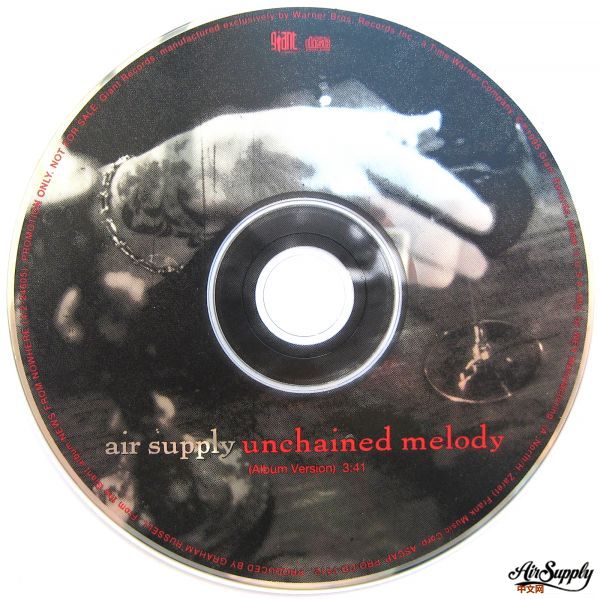
Unchained Melody - U.S. CD Single (Giant)
As 1995 drew to a close, Russell and Graham reminisced about making music together for so many years. “You have to ride the lows and be determined that you can get through this together, to achieve success again and enjoy the kind of success that we are having now,” said Russell. “It’s hard to believe that its been twenty years. I’d never dreamed that we would have maintained such a long career. I have a little seven year old daughter and we will take it a year at a time.” “People ask us what the formula is, and that’s a good question,” Graham said. “When I think about it now it’s like a dream. Like I have been asleep for twenty years. It doesn’t seem that long ago when I think about Australia and the early years.”
With two albums released in the same year, and their international popularity at an all time high, Air Supply planned to slow things down in 1996. “We have some touring plans for next year, and we’ll see what happens after that,” said Graham. “It will probably be another year before we do a studio album. We need some time to refresh ourselves. We’ve probably got twenty or thirty new songs for the next album. Right now, we just want to see what happens to the greatest hits live collection, and we’ll make plans when we have to. After this I don’t think we will release anything until 1997. We don’t want people to get fed up with us! I’d also like to do movie scores. Nobody has asked me, but I’d like to.”
1996 began with a tour throughout the U.S., including a performance in Alaska. The smaller venues that Air Supply played in the U.S. allowed fans to experience a more intimate performance. This included reworked versions of the group’s hits and also acoustic performances. “Our profile in the U.S. is much lower than it is in a lot of other countries, so we sort of scale the show down to suit the audience,” said Graham. “This is our 20th year together. So to keep playing the hits the way they were is virtually impossible for us. Of course, the audience will still recognize them completely, they’ll just be in a different light.”
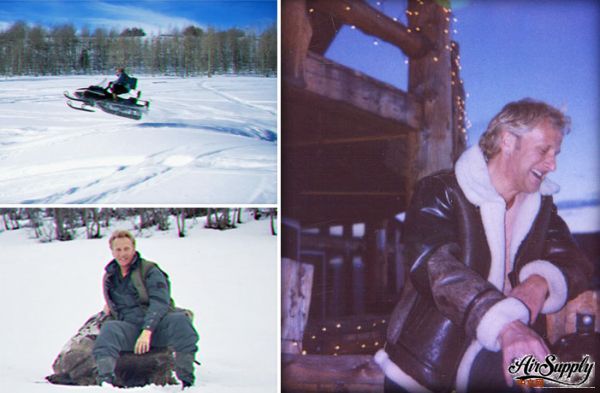
Graham's Home in Utah
Graham took advantage of this time in America to build a recording studio on the top floor of his home in Utah. The 32-track home studio was an important step for Air Supply because it gave them greater control over the recording process, and made them less reliant on Giant Records, who were becoming less interested in throwing money into the band. “It gives me more freedom,” said Graham. “I don’t worry about spending money with the clock ticking. I can work at my own leisure, and start preproduction and put the songs in order.” Los Angeles was Air Supply’s main recording base for many years but most of the band was now living in Utah, so it made sense to centralize the recording process. Furthermore, Graham was now comfortable producing his own music, and was hoping to produce and promote other bands in the future. In addition to the new studio, Graham and Jodi purchased 1,000 acres of land adjacent to their property, with the intention of creating a wildlife preserve. “We do love it here,” said Graham. “I don’t think we could buy this place anywhere else.”
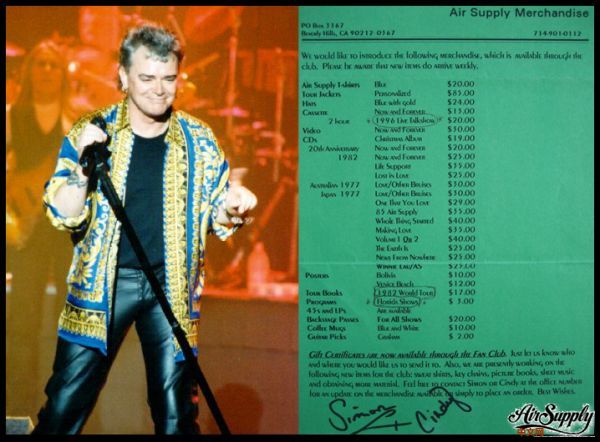
Fan Club Merchandise 1996
Giant Records released ‘Greatest Hits Live... Now and Forever’ in Europe and North America in February. The CD was already considered a big success in Asia, where it soon reached sales of over 500,000 units, and became the second best selling album of 1996 in Hong Kong. Only Celine Dion and her ‘Falling Into You’ album kept Air Supply from the top spot. The Giant Records CD featured a reversed album title, and included just 12 tracks compared to 15 on the earlier BMG international release. “We have been asked for ten years to record a live album,” says Graham. “We have never done one. Because this is our 20th year, it was time to do it.” ‘Greatest Hits Live... Now and Forever’ was the first hits collection released in North America since the multi-platinum 1983 ‘Greatest Hits,’ and it sold surprisingly well despite having no support from radio.
The Air Supply fan club went through major changes in 1996. Club organizers Cindy and Simon Russell put together a new lifetime membership offer, which included a welcome package complete with Air Supply collectibles and a backstage pass valid for all live shows. The club operated out of Beverly Hills, California.
Air Supply was well ahead of most bands when they launched a home page on the internet in 1996. The initial site was rather primitive, like most websites at the time, but for fans with internet access, the website offered a plethora of information about the band, including concert dates and new merchandise promotion. Online commerce was still several years away from becoming mainstream, so Air Supply merchandise had to be ordered through the official fan club by phone or mail. The website was especially important to Air Supply fans because it provided information about the band at a time when the media, particularly in North America, showed no interest in them.
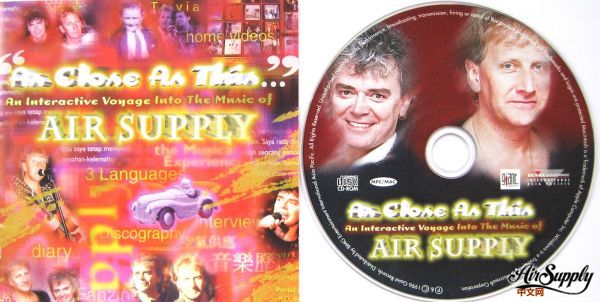
The newly renovated fan club sold the final item in the ‘Now and Forever’ karaoke/video project, a unique CD-ROM called ‘As Close As This...’ An Interactive Voyage Into The Music of Air Supply. Clive Gardiner and Rosemary Tan produced the ambitious and highly creative CD-ROM, which required a rather powerful computer at that time. The CD featured 50 minutes of exclusive video footage, a new song entitled ‘Mother Said,’ personal career diary of Air Supply, trivia, a media-bank of press articles and many never-before seen photos. The project gave fans a glimpse into the personal, and often guarded lives of Graham and Russell. “I hope you will enjoy the journey and get to know us a little better,” says Russell, “as we’ve shared not only our ‘job’ but also our private lives with you. The last twenty years has been an incredible experience for me. Our beginning in Australia, our first experiences in the U.S. and Asia, our successes and a million other things have been captured for you to explore here.” The CD-ROM was manufactured and distributed by BMG International Asia Pacific and Giant Records. In North America, the CD-Rom was sold exclusively through the official fan club in very small quantities. It quickly sold out and has become the holy grail of Air Supply merchandise.
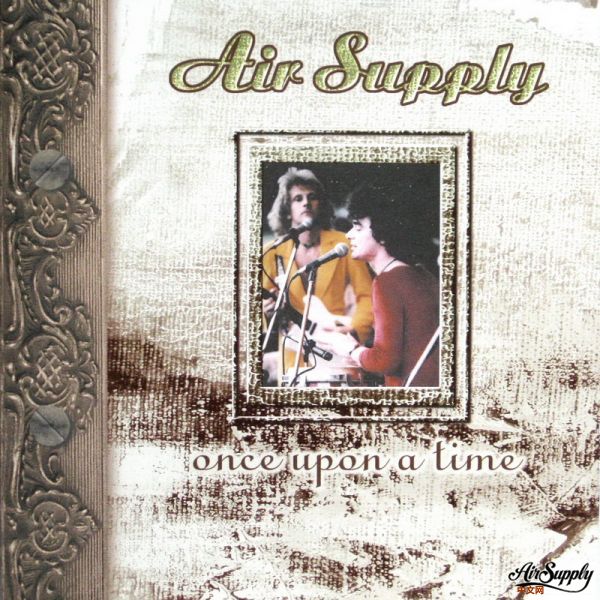
'Once Upon A Time' CD - Korea
Sony Music released a compilation CD in Korea and Taiwan called ‘Once Upon A Time,’ which contained 18 songs from Air Supply’s first three albums. The CD was essentially a time capsule of Air Supply’s early career, with an emphasis on the 1977 U.S. album ‘Love and Other Bruises.’ Unlike most budget conscious CD compilations that contained few or no liner notes, ‘Once Upon A Time’ included a 16-page collector’s booklet with lyrics and never-before seen photos of the band. The CD was housed inside a flashy slipcase designed to resemble a book. ‘Once Upon A Time’ was mostly confined to Asia for several years, until online commerce allowed fans from around the world to discover it. The uniqueness of this CD makes it a popular item with collectors of Air Supply music.
One of the highlights for Air Supply in 1996 was a tour of Australia in June and July. It was Graham and Russell’s first major tour of Australia in 17 years, and they were not sure how the Australian fans would respond after such a long absence. Before the release of ‘Now and Forever Greatest Hits Live,’ Australia essentially ignored Air Supply’s new material. Radio refused to play any of their recent albums. Fortunately, the tour was a success with a 90% sellout of all 12 shows. Guy Allison returned to play keyboards/piano on the Australian tour because Jed Moss was not available.
The Australian concerts were a big hit with the fans, but not with the local music critics, who had a long history of bashing Air Supply:
Air Supply’s performance was a truly bizarre experience. Most of the show was like a cross between Meatloaf and Andrew Lloyd Weber, all overblown rock theatrics, pomp and bombast. Any of the Hilton crowd expecting an evening of gently reflection, a nostalgia act pumping coins into the jukebox of its greatest hits, received a rude shock. Air Supply were like the Spinal Tap of love ballads. Graham Russell and Russell Hitchcock, augmented by bass, drums, pianoforte and electric cello, declined to play some of the better-known material, opting for more recent, heavier songs from albums that went unreleased or largely ignored in Australia.
It was one of those ‘we’re still artists’ gestures that seemed out of place on the Hilton circuit. When they did bring out the hits, many were dealt with heavy-handedly, devoid of their original sweetness. Hitchcock, his voice in fine shape, did his best to charm the audience, but within two songs, his partner Russell was telling us how to behave, calling for the crowd to clap louder, scowling with disapproval as he did so, as if we were all ungrateful children who didn’t deserve to be visited by his talents. Later in the show, having repeated this trick a few times (as well as throwing in a couple of blatantly Messianic poses and patronizingly suggesting that we might not be able to understand his lyrics), he moved to the front of the stage and aggressively gestured for everyone to get to their feet and clap. Now there’s an idea: BYO standing ovation. It was not a complete washout. By the end of the evening, they were in more successful territory with a simple version of ‘Unchained Melody’ and a restrained ‘Here I Am,’ which showcased their attractive voices and melodic skills, but it was too little, too late. - Jon Casimir, The Sydney Morning Herald
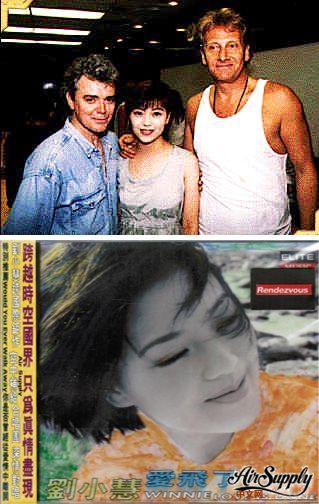
Winnie Lau - 'Love Is Gone' 1996
Air Supply’s success in Asia allowed them to take advantage of a recent surge in sales of multi-artist hit single compilation CDs in the region. Having a song included on a successful compilation CD could fetch a significant royalty cheque for a band. The first volume of the EMI/Polygram ‘Now’ series sold more than 2 million units in Asia alone, doubling the volume previously reached by a compilation album. BMG and Warner Music were eager to join in on this potential and released an international hits package titled ‘Max.’ Among the acts included are Air Supply, Take That, TLC, and Simply Red. Air Supply appeared frequently on American hit compilations in the early 80s, but the popularity of this format faded in North America. “Compilations here [in Asia] have never had that cheap element to it that they may have had in the States: shoddy packaging, songs cut short and stuff like that,” said David Bland of BMG Asia Pacific. Kathleen Tan of Warner Music agreed, and felt it was important for artists to realize that appearing on a compilation CD could do wonders for their wallet. “A lot of our artists,” she said, “don’t immediately recognize the value of compilations. Negotiations can take time, but compilations can really drive sales, and everybody can have a piece of the pie.” Air Supply, who were rarely opposed to releasing their own compilations, were featured on several Asian multi-artist compilations in the late 90s.
Air Supply’s desire to work with Asian artists was realized when Graham wrote and produced a song for Hong Kong singer Winnie Lau. ‘Would You Ever Walk Away’ was a duet between Air Supply and Lau, and was included on Lau’s BMG/Elite album ‘Love Is Gone.’ Winnie Lau was by no means considered a music star in Asia at the time, having released just one previous album, but she was a successful and popular film actress in China. ‘Would You Ever Walk Away’ was released as a single in parts of Asia, and in November it hit #1 in Hong Kong.
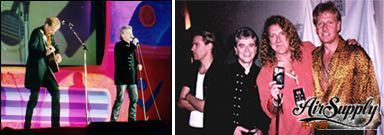
(Right) Bryan Adams, Russell, Robert Plant, Graham - Nov 30, 1996
Channel [V] India, the relatively new music television brand, hosted the Indian Music Awards show on November 30 in Mumbai. The ambitious outdoor event took place at the Andheri Sports Complex, with an estimated crowd of 6,000. The award show featured performances from local Indian acts and several international musicians such as Bryan Adams and Led Zeppelin. Air Supply was one of the main attractions. They performed ‘Now and Forever’ and ‘All Out Of Love’ before a packed house. At the time, Air Supply was the biggest international seller in South Asia, which was home to a third of the world’s population. “I think it’s great that they are hosting this show live on the net,” said Graham. “I don’t really know much about Indian artists, but I hear it is picking up. We still have to see a lot of the country and we are going to do that someday. India is a really cool place to be.” Led Zeppelin and Queen received lifetime achievement honours, while Air Supply won the Channel [V] Chosen One award. The crowd went through the roof when the Australian duo received their award and announced that they would be back in India in January for a performance. The entire event was broadcast on television the following day, and was considered a success despite some technical glitches that delayed the show for almost two hours. “No one has brought this amount of talent to the stage here before,” said Channel [V] India GM Jules Fuller. “Television is such a new medium here: there’s no infrastructure to pull something like this off. Still, we only pulled in five people from the States and England. We bit off a huge chunk. Probably in retrospect we should have done it smaller this year, but it worked really well in the end.”
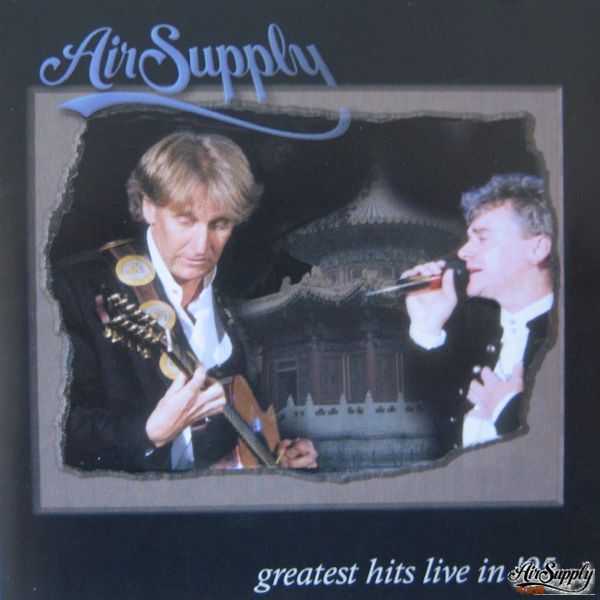
Repackaged CD - Oct. 2002
In December, Air Supply completed a 13-day Christmas-inspired tour across Canada. About half way through each concert, children from the audience were brought on stage and Air Supply performed songs from their 1987 Christmas album, including ‘White Christmas,’ ‘Silent Night,’ ‘The Christmas Song’ and ‘The Eyes Of A Child.’ According to Graham, this was the first time Air Supply had played holiday songs live in concert. The concert at Centennial Concert Hall in Winnipeg included a contingent of WSO (Winnipeg Symphony Orchestra) performers, which added an elegant underlay to the five-member band.
Air Supply had a brief rest over Christmas, before heading to Asia in 1997 for concerts in India, Hong Kong, Kuala Lumpur and Vietnam. 1996 was another year of extensive touring around the world and at home in the U.S. Overall, it was a great twelve months for the band, thanks largely to the success of the ‘Greatest Hits Live’ project. The ‘Greatest Hits Live... Now and Forever’ CD was a big seller for many years. By popular demand, the CD was repackaged in 2002 as a limited edition. The CD, titled ‘Greatest Hits Live in ‘95,’ was designed entirely by Jodi Russell, and included her own photography taken during the 1995 Asian tour. It was sold exclusively through the fan club and at live shows, and included the same 12 tracks to the North American release of ‘Greatest Hits Live... Now and Forever.’ |
|